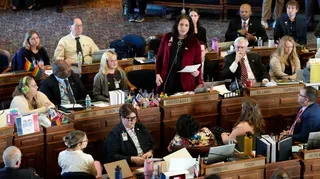December 8, 2009
Marriage Equality Headed to a Legislative Vote in New Jersey
Kilian Melloy READ TIME: 3 MIN.
A bill that would extend marriage rights to gay and lesbian families in New Jersey cleared a committee Dec. 7 and is headed for a legislative vote.
The measure cleared the Senate Judiciary Committee by a single vote--7-6--but not before lawmakers heard from marriage equality advocates, as well as anti-gay activists who wish to see the rights of gays decided by popular vote, the New York Times reported in a Dec. 7 article.
In all but a single instance, marriage equality has been defeated whenever it has been put to a popular vote. Most recently, marriage rights were rescinded at the ballot box in Maine. Last week, the New York senate, voting on similar legislation, defeated a measure that would have granted marriage equality to gay and lesbian families in that state.
Marriage parity supporters have mounted an intensive push to see the bill come up to a vote since the defeat of Gov. Jon Corzine, a marriage supporter, and the impending assumption of the New Jersey governorship by marriage equality opponent Chris Christie limits the measure's window of opportunity. Christie has said he would veto any such measure after he takes power on Jan. 19, 2010; he also favors amending the United States Constitution to bar marriage for any of America's gay and lesbian families.
The New Jersey Senate will only pass the measure if a minimum of 21 favorable votes can be secured, which is uncertain. Previous media reports have said that the state's lawmakers have been spooked by Corzine's loss and by a perceived shift in public support away from equal marriage rights. Assuming the bill does go forward, the Assembly would then vote. If the bill clears both state legislative chambers, it will then head to outgoing Gov. Jon Corzine, who has said he would sign the bill.
Marriage supporters were optimistic. "The marriage-equality movement in America starts again right here," the head of Garden State Equality, Steve Goldstein, told the cheering crowd of supporters who had gathered at the State House.
But anti-gay activists vowed that equal treatment before the law would be denied gay and lesbian families. "We've got a long way to go. And the will of the people, who do not support this, will be heard in the end," The Council on the American Family's Seriah Rein said.
A poll released by Rutgers-Eagleton on Nov. 19 showed that just under half--46 percent--of New Jersey residents support marriage equality. But the margin was slim: another 42 percent opposed legal parity for same-sex couples, and 12 percent weren't sure where they fell on the issue.
"While this tests opinion outside the intensity of a campaign to ban gay marriage, as occurred in California, there is more of a 'live and let live' attitude in New Jersey than in many other states that have dealt with this issue," said the survey's director, David Redlawsk, a Rutgers University professor of political science.
Other opponents fell back on claims that only heterosexual marriage is "natural." "Marriage is a unique natural institution, and it is always between one man and one woman," stated the New Jersey Catholic Conference's executive director, Patrick Branigan.
Some opponents of marriage equality, such as Branigan, say that the state's civil unions provisions grant adequate protections to gay and lesbian families. But the status of civil unions does not confer certain rights that gay families and their supporters say are essential, such as hospital visitation, or health insurance for the partner and children of a gay or lesbian employee. The New York Times cited a lesbian couple, Marsha Shapiro and Louise Walpin, who say they cannot get obtain the same insurance coverage that a heterosexual married couple could get; moreover, the couple, who are in a civil union and who have been partnered for two decades, say that they have encountered workplace discrimination on the basis of their sexuality.
"The State of New Jersey has promised us the right to equal legal protection," Walpin said. "Our family has suffered enough. Please support us and give us the legal protection that we need."
Opponents included some of the state's Hasidic rabbis, who typically do not engage in politics, but who say that in the case of marriage equality they have no choice. Ultra-Orthodox marriage opponents sported placards warning that marriage parity would constitute a "threat" to religious freedoms, a claim often made by groups who base their opposition to civil marriage equality on their religious beliefs, NJ.com reported on Dec. 7. Meanwhile, gay and lesbian families brought their children to the State House to underscore the need of their families to obtain the same protections, obligations, and privileges that are accorded those who are allowed to marry legally.
The issue may go up for a vote as soon as Dec. 10, the article said.
Kilian Melloy serves as EDGE Media Network's Associate Arts Editor and Staff Contributor. His professional memberships include the National Lesbian & Gay Journalists Association, the Boston Online Film Critics Association, The Gay and Lesbian Entertainment Critics Association, and the Boston Theater Critics Association's Elliot Norton Awards Committee.






